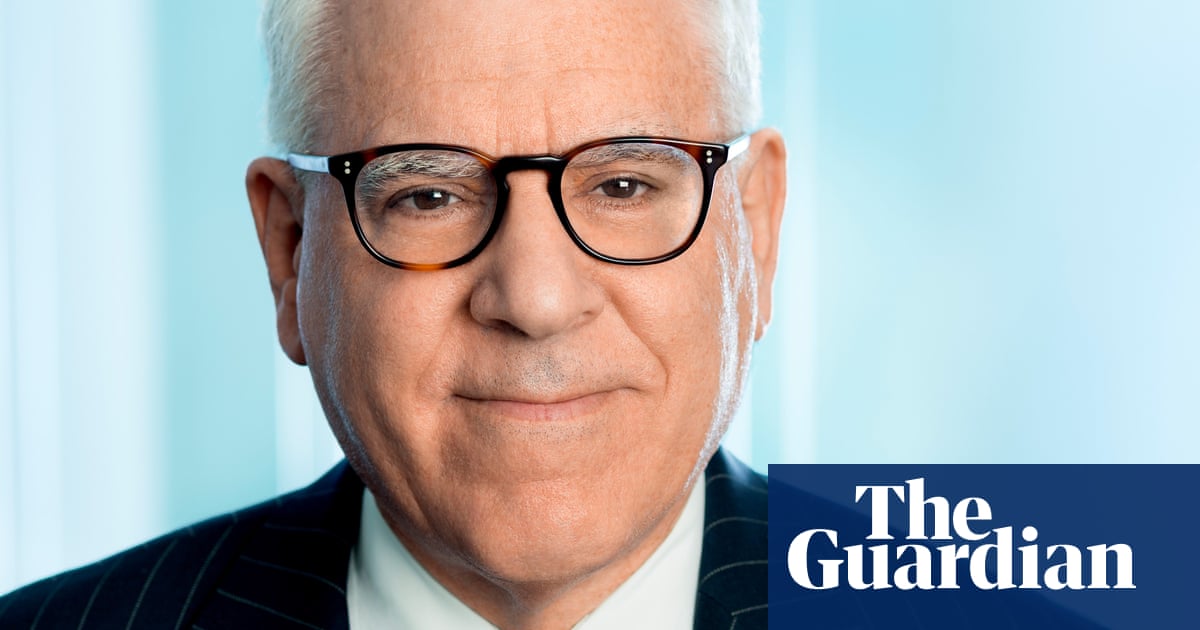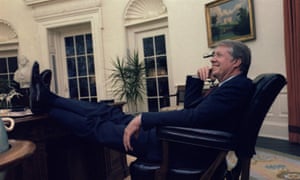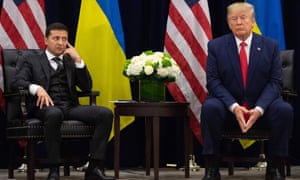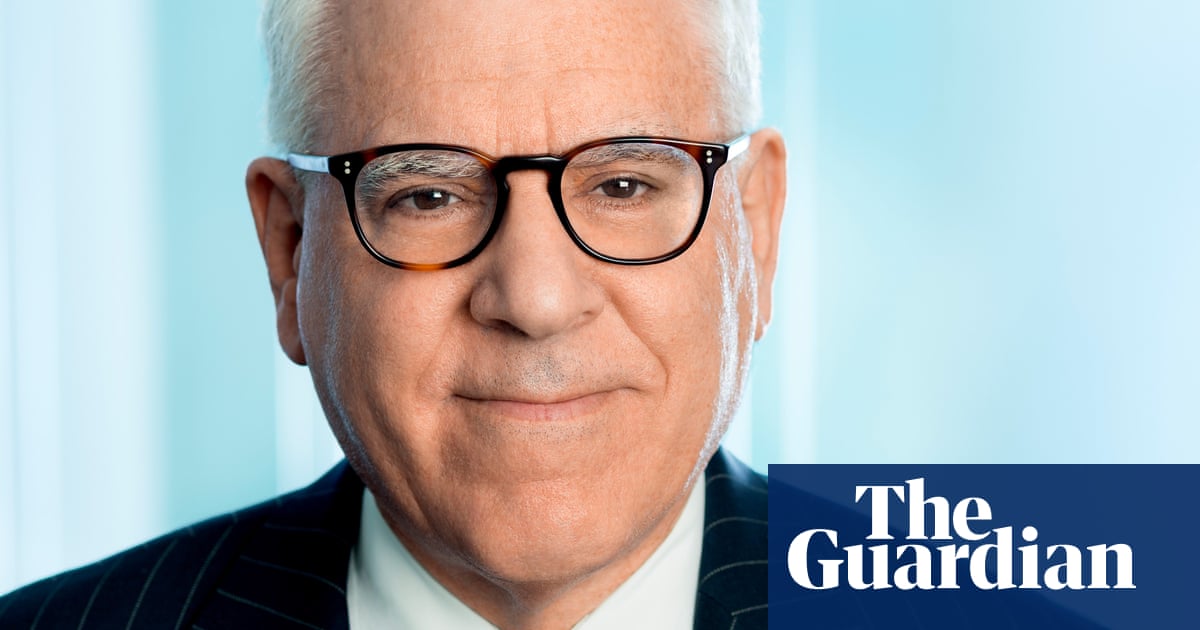The billionaire is also an interviewer in July, Mike Pompeo told him something about the president that seems newly significant

At the Economic Club of Washington DC, one day in July this year, David Rubenstein asked Mike Pompeo a question. When working with Donald Trump, the billionaire philanthropist-cum-interviewer asked the secretary of state, what is the process by which decisions are made?
Pompeo said there was a very robust National Security Council process, and that when meeting the president, he always brought a one-page summary, at the very least, that says, Heres the outline of what it is that I think are the priorities now.
And then he said something else: Trump is very focused on where the money is, and how we use economic leverage to achieve our diplomatic ends.
The interview took place on 29 July 2019. That was four days after Pompeo and other senior aides sat in on a call between Trump and Vlodymyr Zelenskiy, the new president of Ukraine.
Whether Trump asked Zelenskiy to carry out investigations of his political rivals in return for the release of nearly $400m in military aid, and whether that would constitute a serious abuse of power, is now the key issue in the impeachment inquiry.
On a rainy Halloween in New York City, in a 33rd-floor conference room at the Carlyle Group, the investment giant Rubenstein co-founded, the interviewer sits down to be interviewed.
At the same time, in Washington, on Capitol Hill, House Democrats are passing a vote to formalise the impeachment process.
I read him Pompeos quote.
I hadnt gone back and read that transcript since I did the interview, Rubenstein says, and you just pointed out something I hadnt focused on.
I guess thats revealing in the way its put.
Rubenstein is not a journalist but he spends a great deal of time interviewing politicians and leaders. He is not a historian, but he spends a great deal of time interviewing historians. Which is why were here.
Rubenstein still chairs the Carlyle Group and according to Forbes is worth $3bn and change. But for some time he has been practising what he calls patriotic philanthropy.
Most visibly, that means buying historic documents (Magna Carta, the Declaration of Independence, the Emancipation Proclamation) and restoring important sites (the Washington Monument, Monticello, the Lincoln Memorial). Two days before we meet, he announces $10m for the Jefferson Memorial in Washington.
Less visibly, and in the vein of his interviews for the Economic Club and Bloomberg and PBS, Rubenstein hosts congressional dialogues. At the Library of Congress, a bipartisan audience of representatives and senators mingles, dines and listens as Rubenstein interviews selected master historians.
Now comes a book, The American Story, which reprints 16 such discussions and aims to raise money for the librarys literacy programmes. The subjects and experts range from Washington, Jefferson and Lincoln (Jack D Warren, Jon Meacham, Doris Kearns Goodwin) to Lindbergh, King and Nixon (A Scott Berg, Taylor Branch, Bob Woodward).
The title is appropriate: this is history with the emphasis on story, clubbable rather than scholarly but not overly so. The interviews are readable, revealing, even surprisingly funny. Turn one page and HW Brands is revealing to an audience at least part-Republican Ronald Reagans lack of warmth to his children and failing memory while in the Oval Office. Turn another and Berg is detailing how Charles Lindbergh managed his solo Atlantic flight without recourse to a toilet.
Turn another, and Rubenstein is asking Jay Winik about Hitler: Whats with that moustache? As an interview technique, its idiosyncratic and not particularly hard-hitting, but its often productive.
What I do when I do an interview, he says, is I always read the book or do a lot of research in advance. I write down the questions and then I kind of memorize the questions and I kind of have a logical way of doing it. And so if I have 35 questions, Ill probably remember 32 or 33 and nobody will know but me that I forgot one.
But also I think it helps with the eye contact. See, when you have a piece of paper, my theory is you look down. The second you look down, youve lost the eye contact. Its less a conversation, more like an interview. Thats why I do it that way, but everybody has their own style. Thats just mine.
True enough. My own research shows Rubenstein will devote the first part of any interview to interviewing his interviewer himself. Before I switch on the recorder he has established that I come from a city, Leeds, where he has ancestors thanks to an influx of Ukrainian Jews in the early 20th century.
The questions keep coming. Being quizzed by a titan of business, it turns out, is an unusual experience indeed.
Ask Bob Woodward. The great reporter sat down with Rubenstein to discuss Watergate, of course, but also what came after: Nixons final days, George W Bush and 9/11, Barack Obama, Afghanistan and Iraq.
They also talked about the time Woodward got a scoop on a memo written by a young aide in the Carter White House: Rubenstein.
I remember it very clearly, he says. I would write a memo and I would put my bosss name on it typically, but I might have had my name on this one as well. And this is what the essence of it was
Carter went to Asia. He was going on the flight back to spend a day or two in Hawaii, recuperating. And the essence of it was [me] saying that, We got gas lines here, its terrible. You shouldnt really spend time in Hawaii, it wouldnt look good. Just fly all the way back and you should know that the gas lines are a big problem and we need to blame the appropriate people, and lets blame Opec for it.
He sent the memo to Carter, he says, and then somebody, I guess, didnt like the memo. And they leaked it to Bob Woodward.

So Woodward is going to write an article, and he asked me about it, but he was going to write the article saying, Rubenstein and Stuart Eizenstat, my boss, tell the president he should blame Opec for the problems, not blame yourself. It was embarrassing to have your memo leak, and it didnt make me popular. I didnt know if Id get fired or not.
But anyway, that was what it was. And then Bob, later I got to know him.
In fact, in The American Story Woodward says the memo suggested a war on Opec rather more than simple blame and Rubenstein agrees.
Either way, Rubenstein soon realised he didnt want to be a lawyer and went into finance instead. It worked out, and as he remained a voracious reader on history, biography, politics and business he aims to ingest 100 books a year and because his extraordinary wealth gave him extraordinary proximity to power, he started interviewing anyone who was anyone in each of those fields.
The American Story has attracted criticism for being a book full of white men, both its subjects and those discussing them. Kearns Goodwin on Lincoln and the late Cokie Roberts on the Founding Mothers stand out, as does Branchs great subject, Martin Luther King. But Rubenstein acknowledges the flaw.
I have done another series of 18 or so dialogues, he says, and they have probably more women and more black authors. One of the authors I wanted to put in here was Annette Gordon-Reed, who wrote The Hemingses of Monticello, and it turned out the transcript didnt quite work I have done another interview of her and Im going to put it in the next book or somewhere else.
He has also interviewed Lonnie Bunch, formerly director of the National Museum of African American History and Culture, now secretary of the Smithsonian, where Rubenstein is chair of the board.
But I would say, yeah, the authors do not reflect the diversity of our country today. On the other hand, they do reflect some of the leading American historians, but you can always say I could do a better job, and Id say, probably yes.
Discussing such great and flawed white men, Rubenstein marvels at how one 18th-century generation produced George Washington, Benjamin Franklin, Thomas Jefferson, James Madison, John Adams and Alexander Hamilton.
Now, he says, we have 330 million people and where are the great people?
His theory is theyre all in private equity. Mine is theyre all in journalism. He says he regrets not taking a chance to buy the Washington Post before Jeff Bezos did, and were back in the present day.
In his introduction, Rubenstein quotes a line that springs to mind as we discuss Nixon. Its George Santayana: Those who cannot remember the past are condemned to repeat it.
Every interview Ive done with a historian recently Sarah Bakewell, Saul Friedlnder, Sidney Blumenthal, David Blight has turned to the present, and to what their books might tell readers about the conundrum of Trump.
Rubenstein says he doesnt feel any pressure to pass judgment but from a historical point of view, most historians would say you cant tell how successful a president is or is not while he is in office.
Think about this. When Harry Truman left the presidency, he was considered terrible, 15% approval ratings. When Jimmy Carter left, he was considered terrible. George Herbert Walker Bush, he lost re-election. In time, history has revived these people, just as John Adams has been revived. So its hard to say. Most historians would say it takes at least 40 years after a person dies before you can read all the documents and really know.
I have my views on President Trump. I do know him reasonably well and Ive spent a reasonable amount of time with him. I have my views on him, but I would say right now, its too early to say how history will regard him and this is the reason.
Lets suppose I tell you that we have an attack on the homeland tomorrow here, and he somehow does a very good job in defending the homeland. Or some other thing happens, the military does something great and the president, as commander-in-chief, gets credit for it, ie, killing a leader in the Middle East [a reference to the recent death of Abu Bakr al-Baghdadi].
He may get to be very popular, and despite some of the flaws that have become evident, you cant tell that he wont be popular or that he wont be successful. I think its too early to say.

Of course, Trump rarely feels such need for circumspection. He didnt when he spoke to Zelinskiy and he didnt, at least initially, when he sat down to talk to Rubenstein.
I didnt really know him that well then, Rubenstein says. I wrote him a letter and asked him to come down [to the Economic Club in December 2014]. He said he would and he told me to ask him if he was going to run for president. I was going, What? He said he might run for president, in the green room. I was surprised.
He called me later and told me he really liked the interview, he thought it was well done, and Ive asked him recently if I could do another one at the Economic Club with him, and he said that we would probably be able to do it if his schedule worked, but then hes gotten diverted on other stuff, I think.
No doubt. Rubensteins Trump transcript does not contain anything quite so startling as that from Pompeo. But it does contain the following:
MR RUBENSTEIN: Is there any downside to being Donald Trump?
MR TRUMP: Well, I have to be very careful of that answer. That can get me into a lot of trouble.
Read more: https://www.theguardian.com/us-news/2019/nov/01/david-rubenstein-interview-trump-the-american-story


Recent Comments